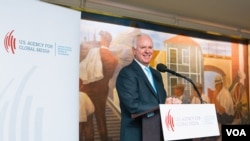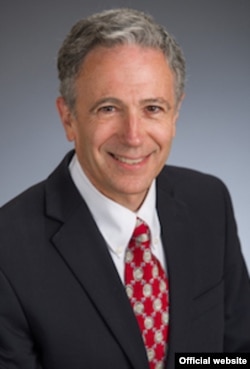The announcement of John Lansing’s resignation as CEO of the U.S. Agency for Global Media is renewing questions about the mission and direction of the broadcasters it oversees.
The USAGM directly manages five international news entities, including Radio Free Asia, Radio Free Europe/Radio Liberty and the Voice of America. Combined, the USAGM broadcasters transmit in 61 languages and have an unduplicated weekly audience of 345 million.
Lansing, 62, a veteran cable TV executive, was named CEO of USAGM in 2015 and has now served under two presidents. He will formally leave the agency at the end of September and start in mid-October as CEO of the domestic National Public Radio network.
“John Lansing is going to leave behind a really remarkable legacy,” said Amanda Bennett, director of the Voice of America. “He really focused USAGM on issues of a free and independent press. That’s going to be his legacy. That, and his sunny disposition.”
Trump nominee
President Donald Trump has nominated documentary filmmaker Michael Pack to replace Lansing. Pack, a senior fellow and former president at the Claremont Institute in California, has collaborated on film projects with former Trump adviser Stephen Bannon.
Pack’s name was sent to the Senate in January but has been stuck in the Senate Foreign Relations Committee. Efforts to reach committee Chairman Jim Risch, an Idaho Republican, and ranking member Bob Menendez, a New Jersey Democrat, were unsuccessful.
Pack could become the CEO in one of two ways: by Senate approval or appointment by the advisory Broadcasting Board of Governors (BBG), a bipartisan panel that includes Secretary of State Mike Pompeo.
Pack’s nomination sparked debate about Trump’s intentions for the agency, as has the president’s own words and repeated criticism of the U.S. media.
On Twitter last November, Trump complained about unfair coverage by CNN and mused, “Something has to be done, including the possibility of the United States starting our own Worldwide Network to show the World the way we really are, GREAT!”
A few days later, Bennett published an op-ed in The Washington Post stating that such a network already existed: VOA.
Under VOA’s charter, its journalists are required to report “accurate, objective and comprehensive” news. Other legal provisions, collectively known as the “firewall,” protect VOA journalists from political interference in their work.
“Whoever the next CEO is, they need to look at the history of the agency,” said Danforth Austin, a former reporter and executive at The Wall Street Journal who served as VOA director from 2006 to 2011.
Changed focus
Austin said that during WWII, and then the Cold War, VOA and the other U.S.-funded news entities were largely a propaganda tool. But from the 1960s on, they transformed into solid journalistic organizations with a mandate to provide balanced and independent news.
“There are all kinds of different groups with different ideas of what we should or shouldn’t be broadcasting,” Austin said. “I recall getting calls from the State Department saying, ‘You can’t do that!’ I would always politely suggest they call the secretary of state and hang up the phone.”
“Propaganda or news, you have to decide, ‘What’s the most effective approach?’ ” he added.
Representative Eliot Engel, a New York Democrat, chairs the House Committee on Foreign Affairs. Although he has no vote in the Senate, his committee wields influence on Capitol Hill over USAGM.
Engel praised Lansing on Friday for putting the USAGM’s networks “ … on a path toward becoming modern, effective news organizations providing unbiased information in some of the world’s most closed media spaces.”
But he said that if the Senate does not confirm Pack in a timely manner, the BBG should exercise its power and appoint someone.
“The existing Board of Governors retains the power to name a replacement. I urge the board to do so immediately, as we can’t predict when the Senate may act on the president’s nominee. This is too important a job to be left vacant for even a day,” he added.
The USAGM has its share of critics. Engel’s predecessor, former Representative Ed Royce, a California Republican, has called it a “broken agency.” Hillary Clinton, while secretary of state, said the agency was “practically defunct in terms of its capacity to tell a message around the world.”
Bennett and Austin attributed audience growth under Lansing to a focus on independent and unbiased news coverage. In 2018, its audience expanded 24%, a record.
“Sixty percent of our audience around the world believes us and trusts us,” Bennett said. “John’s focus on editorial independence is what must carry on if we’re not to squander that trust built up over the years.”






